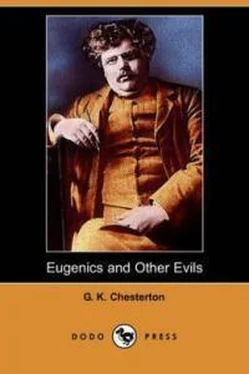Гилберт Честертон - Eugenics and Other Evils
Здесь есть возможность читать онлайн «Гилберт Честертон - Eugenics and Other Evils» весь текст электронной книги совершенно бесплатно (целиком полную версию без сокращений). В некоторых случаях можно слушать аудио, скачать через торрент в формате fb2 и присутствует краткое содержание. Год выпуска: 2014, Издательство: epubBooks Classics, Жанр: Публицистика, на английском языке. Описание произведения, (предисловие) а так же отзывы посетителей доступны на портале библиотеки ЛибКат.
- Название:Eugenics and Other Evils
- Автор:
- Издательство:epubBooks Classics
- Жанр:
- Год:2014
- ISBN:нет данных
- Рейтинг книги:4 / 5. Голосов: 1
-
Избранное:Добавить в избранное
- Отзывы:
-
Ваша оценка:
- 80
- 1
- 2
- 3
- 4
- 5
Eugenics and Other Evils: краткое содержание, описание и аннотация
Предлагаем к чтению аннотацию, описание, краткое содержание или предисловие (зависит от того, что написал сам автор книги «Eugenics and Other Evils»). Если вы не нашли необходимую информацию о книге — напишите в комментариях, мы постараемся отыскать её.
Eugenics and Other Evils — читать онлайн бесплатно полную книгу (весь текст) целиком
Ниже представлен текст книги, разбитый по страницам. Система сохранения места последней прочитанной страницы, позволяет с удобством читать онлайн бесплатно книгу «Eugenics and Other Evils», без необходимости каждый раз заново искать на чём Вы остановились. Поставьте закладку, и сможете в любой момент перейти на страницу, на которой закончили чтение.
Интервал:
Закладка:
But though I have to consider this dull matter in its due logical order, it appears to me that this part of the matter has been settled, and settled in a most masterly way, by somebody who has infinitely more right to speak on it than I have. Our press seems to have a perfect genius for fitting people with caps that don't fit; and affixing the wrong terms of eulogy and even the wrong terms of abuse. And just as people will talk of Bernard Shaw as a naughty winking Pierrot, when he is the last great Puritan and really believes in respectability; just as ( si parva licet etc.) they will talk of my own paradoxes, when I pass my life in preaching that the truisms are true; so an enormous number of newspaper readers seem to have it fixed firmly in their heads that Mr. H.G. Wells is a harsh and horrible Eugenist in great goblin spectacles, who wants to put us all into metallic microscopes and dissect us with metallic tools. As a matter of fact, of course, Mr. Wells, so far from being too definite, is generally not definite enough. He is an absolute wizard in the appreciation of atmospheres and the opening of vistas; but his answers are more agnostic than his questions. His books will do everything except shut. And so far from being the sort of man who would stop a man from propagating, he cannot even stop a full stop. He is not Eugenic enough to prevent the black dot at the end of a sentence from breeding a line of little dots.
But this is not the clear–cut blunder of which I spoke. The real blunder is this. Mr. Wells deserves a tiara of crowns and a garland of medals for all kinds of reasons. But if I were restricted, on grounds of public economy, to giving Mr. Wells only one medal ob cives servatos , I would give him a medal as the Eugenist who destroyed Eugenics. For everyone spoke of him, rightly or wrongly, as a Eugenist; and he certainly had, as I have not, the training and type of culture required to consider the matter merely in a biological and not in a generally moral sense. The result was that in that fine book, "Mankind in the Making," where he inevitably came to grips with the problem, he threw down to the Eugenists an intellectual challenge which seems to me unanswerable, but which, at any rate, is unanswered. I do not mean that no remote Eugenist wrote upon the subject; for it is impossible to read all writings, especially Eugenist writings. I do mean that the leading Eugenists write as if this challenge had never been offered. The gauntlet lies unlifted on the ground.
Having given honour for the idea where it is due, I may be permitted to summarise it myself for the sake of brevity. Mr. Wells' point was this. That we cannot be certain about the inheritance of health, because health is not a quality. It is not a thing like darkness in the hair or length in the limbs. It is a relation, a balance. You have a tall, strong man; but his very strength depends on his not being too tall for his strength. You catch a healthy, full–blooded fellow; but his very health depends on his being not too full of blood. A heart that is strong for a dwarf will be weak for a giant; a nervous system that would kill a man with a trace of a certain illness will sustain him to ninety if he has no trace of that illness. Nay, the same nervous system might kill him if he had an excess of some other comparatively healthy thing. Seeing, therefore, that there are apparently healthy people of all types, it is obvious that if you mate two of them, you may even then produce a discord out of two inconsistent harmonies. It is obvious that you can no more be certain of a good offspring than you can be certain of a good tune if you play two fine airs at once on the same piano. You can be even less certain of it in the more delicate case of beauty, of which the Eugenists talk a great deal. Marry two handsome people whose noses tend to the aquiline, and their baby (for all you know) may be a goblin with a nose like an enormous parrot's. Indeed, I actually know a case of this kind. The Eugenist has to settle, not the result of fixing one steady thing to a second steady thing; but what will happen when one toppling and dizzy equilibrium crashes into another.
This is the interesting conclusion. It is on this degree of knowledge that we are asked to abandon the universal morality of mankind. When we have stopped the lover from marrying the unfortunate woman he loves, when we have found him another uproariously healthy female whom he does not love in the least, even then we have no logical evidence that the result may not be as horrid and dangerous as if he had behaved like a man of honour.
Chapter VII
The Established Church of Doubt
Let us now finally consider what the honest Eugenists do mean, since it has become increasingly evident that they cannot mean what they say. Unfortunately, the obstacles to any explanation of this are such as to insist on a circuitous approach. The tendency of all that is printed and much that is spoken to–day is to be, in the only true sense, behind the times. It is because it is always in a hurry that it is always too late. Give an ordinary man a day to write an article, and he will remember the things he has really heard latest; and may even, in the last glory of the sunset, begin to think of what he thinks himself. Give him an hour to write it, and he will think of the nearest text–book on the topic, and make the best mosaic he may out of classical quotations and old authorities. Give him ten minutes to write it and he will run screaming for refuge to the old nursery where he learnt his stalest proverbs, or the old school where he learnt his stalest politics. The quicker goes the journalist the slower go his thoughts. The result is the newspaper of our time, which every day can be delivered earlier and earlier, and which, every day, is less worth delivering at all. The poor panting critic falls farther and farther behind the motor–car of modern fact. Fifty years ago he was barely fifteen years behind the times. Fifteen years ago he was not more than fifty years behind the times. Just now he is rather more than a hundred years behind the times: and the proof of it is that the things he says, though manifest nonsense about our society to–day, really were true about our society some hundred and thirty years ago. The best instance of his belated state is his perpetual assertion that the supernatural is less and less believed. It is a perfectly true and realistic account—of the eighteenth century. It is the worst possible account of this age of psychics and spirit–healers and fakirs and fashionable fortune–tellers. In fact, I generally reply in eighteenth century language to this eighteenth century illusion. If somebody says to me, "The creeds are crumbling," I reply, "And the King of Prussia, who is himself a Freethinker, is certainly capturing Silesia from the Catholic Empress." If somebody says, "Miracles must be reconsidered in the light of rational experience," I answer affably, "But I hope that our enlightened leader, Hébert, will not insist on guillotining that poor French queen." If somebody says, "We must watch for the rise of some new religion which can commend itself to reason," I reply, "But how much more necessary is it to watch for the rise of some military adventurer who may destroy the Republic: and, to my mind, that young Major Bonaparte has rather a restless air." It is only in such language from the Age of Reason that we can answer such things. The age we live in is something more than an age of superstition—it is an age of innumerable superstitions. But it is only with one example of this that I am concerned here.
I mean the error that still sends men marching about disestablishing churches and talking of the tyranny of compulsory church teaching or compulsory church tithes. I do not wish for an irrelevant misunderstanding here; I would myself certainly disestablish any church that had a numerical minority, like the Irish or the Welsh; and I think it would do a great deal of good to genuine churches that have a partly conventional majority, like the English, or even the Russian. But I should only do this if I had nothing else to do; and just now there is very much else to do. For religion, orthodox or unorthodox, is not just now relying on the weapon of State establishment at all. The Pope practically made no attempt to preserve the Concordat; but seemed rather relieved at the independence his Church gained by the destruction of it: and it is common talk among the French clericalists that the Church has gained by the change. In Russia the one real charge brought by religious people (especially Roman Catholics) against the Orthodox Church is not its orthodoxy or heterodoxy, but its abject dependence on the State. In England we can almost measure an Anglican's fervour for his Church by his comparative coolness about its establishment—that is, its control by a Parliament of Scotch Presbyterians like Balfour, or Welsh Congregationalists like Lloyd George. In Scotland the powerful combination of the two great sects outside the establishment have left it in a position in which it feels no disposition to boast of being called by mere lawyers the Church of Scotland. I am not here arguing that Churches should not depend on the State; nor that they do not depend upon much worse things. It may be reasonably maintained that the strength of Romanism, though it be not in any national police, is in a moral police more rigid and vigilant. It may be reasonably maintained that the strength of Anglicanism, though it be not in establishment, is in aristocracy, and its shadow, which is called snobbishness. All I assert here is that the Churches are not now leaning heavily on their political establishment; they are not using heavily the secular arm. Almost everywhere their legal tithes have been modified, their legal boards of control have been mixed. They may still employ tyranny, and worse tyranny: I am not considering that. They are not specially using that special tyranny which consists in using the government.
Читать дальшеИнтервал:
Закладка:
Похожие книги на «Eugenics and Other Evils»
Представляем Вашему вниманию похожие книги на «Eugenics and Other Evils» списком для выбора. Мы отобрали схожую по названию и смыслу литературу в надежде предоставить читателям больше вариантов отыскать новые, интересные, ещё непрочитанные произведения.
Обсуждение, отзывы о книге «Eugenics and Other Evils» и просто собственные мнения читателей. Оставьте ваши комментарии, напишите, что Вы думаете о произведении, его смысле или главных героях. Укажите что конкретно понравилось, а что нет, и почему Вы так считаете.








